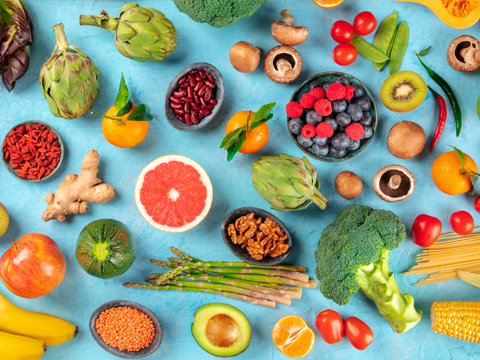Maintaining your microbiota through diet is possible!
Food - Posted onMonday 7 June 2021
The diversity and quality of our diet influence the balance of our intestinal microbiota by favouring the development of bacteria beneficial for the digestive system.
Which foods should we choose?
What are their impacts on microbiota?
In adulthood, the composition of microbiota is fairly stable. However, it can be influenced by the quality and diversity of our diet: the absence of certain nutrients or, on the contrary, the excessive presence of certain foods can have an impact on the biodiversity of the bacteria present in our intestines.
To take care of your microbiota, it is therefore important to identify the main food families that are beneficial to it.
Fresh fruit and vegetables, preferably organically grown.
All the minerals and nutrients your body needs are present in fruit and vegetables. Their main advantage is their high fibre content: the preferred food components of good bacteria!
Choose raw tomatoes, raw carrots, kiwis and radishes, which contain arabinogalactan, a molecule that increases the body’s resistance by stimulating the immune system. Also add garlic, onion, Jerusalem artichoke, leek or asparagus to your cooking! What they all have in common is that they contain inulin, a dietary fibre that acts on our immune and digestive systems.
Did you know that?
Do you have trouble digesting garlic or onions? That’s normal!
They are part of the family of prebiotics, non-digestible fibres in one’s diet. Prebiotics are complex carbohydrates that come exclusively from diet. They are important for intestinal microbiota as they stimulate the growth of beneficial bacteria in the colon. They are found in bananas, tomatoes, onions, garlic, endives, chicory, artichokes, pulses and wholegrain cereals (wheat, oats, rye, wild rice, bulgur, quinoa, spelt, etc.)
Fermented foods
You can incorporate fermented foods such as sauerkraut, kefir (goat’s milk or fruit juice), kombucha (a sour drink made from tea mushrooms and sweet tea) and/or miso (Japanese fermented paste) into your diet. In addition to taking your taste buds on a journey, these foods are rich in natural bacteria, which enrich the microbiota.
The living micro-organisms involved in fermentation are also found in yoghurt, gherkins and soy sauce. This makes it possible to vary the tasty food you eat for this purpose!
These fermented foods are part of the probiotic family, i.e. they contain microorganisms that are beneficial to health. They help to rebalance the intestinal microbiota and strengthen the immune system, and have an analgesic effect.
Spices
To take care of yourself and your digestive comfort, don’t hesitate to spice up your dishes! Cinnamon stabilises blood sugar levels and allows the body to burn fat rather than store it. However, studies show that humans need to consume very large quantities to see a real impact. Turmeric also plays an essential role in your gut: it protects it by preserving your microbiota. Its role is very comprehensive as it also protects brain activity!
Don’t hesitate to add oregano, thyme or tarragon to your dishes: in addition to adding flavour, spices help destroy pathogenic bacteria in your microbiota.
Resistant starch
Although most of the starch in our food (white bread, pasta) is digested, a small part is resistant and acts as a fibre to feed intestinal bacteria. This resistant starch is mainly present in potatoes and legumes (split peas, kidney beans, flageolets, lentils, white beans, etc.), as well as in starchy foods once they have been cooked and then cooled in the refrigerator.
Honey
As a natural antibacterial and antioxidant, honey stimulates the proliferation of good bacteria in your intestinal microbiota.
Foods to limit!
Too many sugars or carbohydrates (white bread, pasta, rice, etc.) are the source of a fermentation flora that disturbs the microbiota. Consequences?
Bloating, abdominal pain and gas.
Similarly, too much protein (meat, eggs, fish, milk) generates putrefactive flora, i.e. an excess of odorous gas, and abdominal pain.
To promote the balance of your microbiota, make sure you chew well. Thorough chewing makes it easier for your intestines to work. The small pieces of food go to your stomach via the oesophagus, where gastric contractions and gastric acid help to sort out the so-called solid foods that need to be kneaded and those that can go to the intestine.
Another tip: pay attention to your lifestyle!
Indeed, as the bacteria that make up our microbiota function in a 24-hour cycle, it is in your best interest to eat the same number of meals a day, at regular times. Similarly, regular and sufficient sleep can only be beneficial to your intestinal microbiota. Regular physical exercise is also said to have a positive impact on our microbiota by increasing the diversity of the bacteria that make it up.
